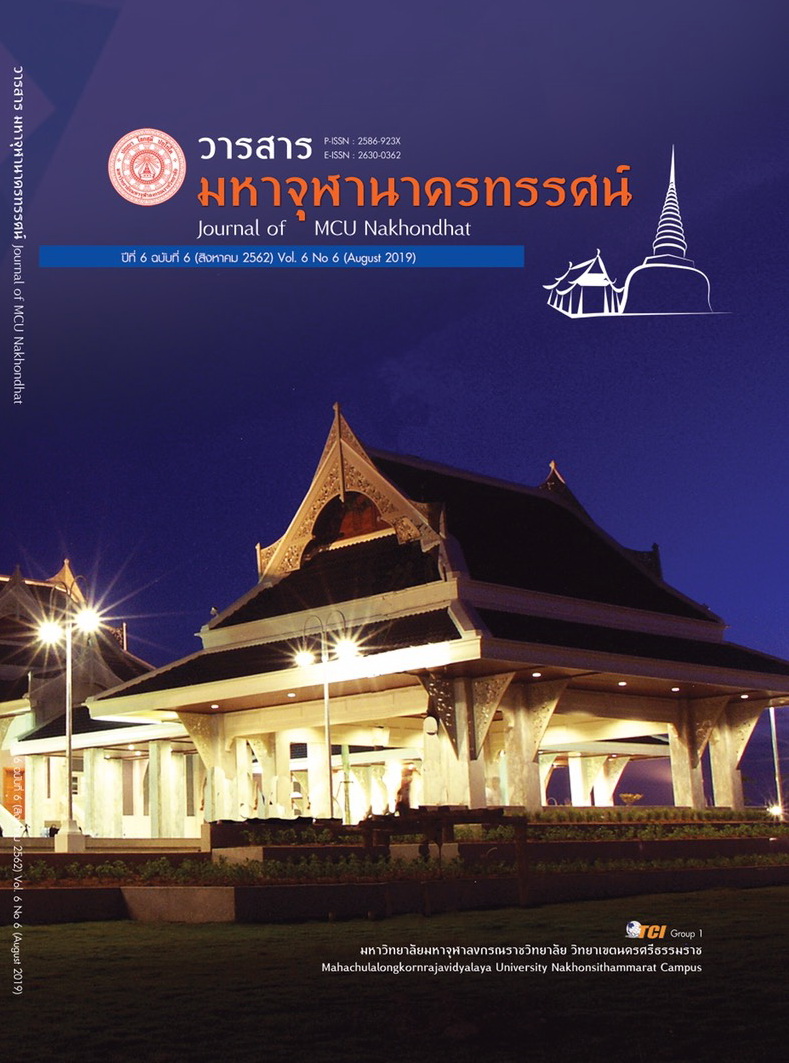A MODEL OF BUSINESS ADMINISTRATION OF THE DEPARTMENT STORES IN ACCORDANCE WITH BUDDHIST DOCTRINES
Main Article Content
Abstract
This research aims were 1) to study the concept of business management and state of the department stores in the Present contemporary 2) to study business management according to Buddhist doctrines and 3) to synthesis a model of the department stores management in accordance to Buddhist doctrines. The research was qualitative. The tools of the research were the in-depth interview, the observation which analysis data by descriptive method.
The resut of research were as follows: -
- The concept of management consists of the principles of the department stores services, customer service. The process of decision-making to select the department stores service, 3) business direction of department stores in Khon Kaen province consist of Big C, Fairy plaza and Robinson.
- Business management based on Buddhist Doctrinces of the administrator of department stores ‘s management in Khon Kaen province by the seven Suppurisa-Dhamma i.e. Dhammannuta: knowing the law. Atthannutta: knowing the meaning, Attannuta: knowing oneself, Mattannuta : moderation, Kalannuta : knowing the proper time, Parisannutta: knowing the society and Puggalannuta: knowing the different individuals. The managers applied the Suppurisa-Dhamma for personal lifestyle, the Sangahavattthu for public lifestyle of a person and the Iddhipada for working style.
- The synthesis of business management model of the Department Stores follows to the three Buddhist Doctrinces as follows; - 1) business characteristics synthesized into the Iddhipada Doctrines for working style 2) the policy and business running synthesized into the Sangahavattthu doctrines for public lifestyle and 3) business direction synthesized into the Suppurisa-Dhamma Doctrines for personal lifestyle.
Article Details
How to Cite
ทรัพย์กนกมาศ อ., . พ., & . พ. (2019). A MODEL OF BUSINESS ADMINISTRATION OF THE DEPARTMENT STORES IN ACCORDANCE WITH BUDDHIST DOCTRINES. Journal of MCU Nakhondhat, 6(6), 3172–3187. retrieved from https://so03.tci-thaijo.org/index.php/JMND/article/view/177387
Section
Research Articles
References
พระธรรมปิฎก (ป.อ.ปยุตฺโต). (2543). การพัฒนาที่ยั่งยืน. (พิมพ์ครั้งที่ 5). กรุงเทพมหานคร: สหธรรมิก.
พระธานี เขมธมฺโม (จำปา). (2550). ศึกษาสัมมาอาชีวะในพระพุทธศาสนา. ใน วิทยานิพนธ์พุทธศาสตรมหาบัณฑิต สาขาวิชาพระพุทธศาสนา. มหาวิทยาลัยมหาจุฬาลงกรณราชวิทยาลัย.
พระพรหมคุณาภรณ์ (ป.อ. ปยุตฺโต). (2550). ธรรมนูญชีวิต. (พิมพ์ครั้งที่ 2). กรุงเทพมหานคร: บริษัทพิมพ์สวย จากัด.
พระมหาสมโภช ฐิติญาโณ (ศรีพันธ์). (2535). ศึกษาวิเคราะห์เศรษฐศาสตร์ตามแนวพระไตรปิฎก. ใน วิทยานิพนธ์พุทธศาสตรมหาบัณฑิต สาขาวิชพระพุทธศาสนา. มหาวิทยาลัยมหาจุฬาลงกรณราชวิทยาลัย.
มหาจุฬาลงกรณราชวิทยาลัย. (2539). พระไตรปิฎกภาษาไทย ฉบับมหาจุฬาลงกรณราชวิทยาลัย. กรุงเทพมหานคร: โรงพิมพ์มหาจุฬาลงกรณราชวิทยาลัย.
รังสี สุทนต์. (2543). เศรษฐีแท้ฟังธรรม. กรุงเทพมหานคร: สำนักพิมพ์สุขภาพใจ.
วิชชารียา เรืองโพธิ์. (2553). ปัจจัยทางการตลาดที่มีอิทธิพลต่อการตัดสินใจเลือกใช้บริการศูนย์การค้าสยามพารากอน. ใน สารนิพนธ์การศึกษามหาบัณฑิต สาขาวิชาการตลาด. มหาวิทยาลัยศรีนครินทรวิโรฒ.
วีระวัฒน์ ปันนิตามัย. (2560). แนวทางการส่งเสริมความรับผิดชอบต่อสังคม (Corporate Social Responsibility : CSR) ด้านการบริหารทรัพยากรบุคคล. เรียกใช้เมื่อ 20 มีนาคม 2560 จาก https://www.ocsc.go.th/11_Jan_2013/1%20Thesis_2553_ 11_Jan_2013
ศิริวรรณ เสรีรัตน์ และคณะ. (2541). ธุรกิจทั่วไป: ความรู้เบื้องต้นเกี่ยวกับการประกอบธุรกิจ. กรุงเทพมหานคร: บริษัทดวงกมลสมัย จำกัด.
อภิชัย พันธเสน. (2547). พุทธเศรษฐศาสตร์ วิวัฒนาการ ทฤษฎีและการประยุกต์กับเศรษฐศาสตร์สาขาต่าง ๆ. (พิมพ์ครั้งที่ 3). กรุงเทพมหานคร: อมรินทร์.
พระธานี เขมธมฺโม (จำปา). (2550). ศึกษาสัมมาอาชีวะในพระพุทธศาสนา. ใน วิทยานิพนธ์พุทธศาสตรมหาบัณฑิต สาขาวิชาพระพุทธศาสนา. มหาวิทยาลัยมหาจุฬาลงกรณราชวิทยาลัย.
พระพรหมคุณาภรณ์ (ป.อ. ปยุตฺโต). (2550). ธรรมนูญชีวิต. (พิมพ์ครั้งที่ 2). กรุงเทพมหานคร: บริษัทพิมพ์สวย จากัด.
พระมหาสมโภช ฐิติญาโณ (ศรีพันธ์). (2535). ศึกษาวิเคราะห์เศรษฐศาสตร์ตามแนวพระไตรปิฎก. ใน วิทยานิพนธ์พุทธศาสตรมหาบัณฑิต สาขาวิชพระพุทธศาสนา. มหาวิทยาลัยมหาจุฬาลงกรณราชวิทยาลัย.
มหาจุฬาลงกรณราชวิทยาลัย. (2539). พระไตรปิฎกภาษาไทย ฉบับมหาจุฬาลงกรณราชวิทยาลัย. กรุงเทพมหานคร: โรงพิมพ์มหาจุฬาลงกรณราชวิทยาลัย.
รังสี สุทนต์. (2543). เศรษฐีแท้ฟังธรรม. กรุงเทพมหานคร: สำนักพิมพ์สุขภาพใจ.
วิชชารียา เรืองโพธิ์. (2553). ปัจจัยทางการตลาดที่มีอิทธิพลต่อการตัดสินใจเลือกใช้บริการศูนย์การค้าสยามพารากอน. ใน สารนิพนธ์การศึกษามหาบัณฑิต สาขาวิชาการตลาด. มหาวิทยาลัยศรีนครินทรวิโรฒ.
วีระวัฒน์ ปันนิตามัย. (2560). แนวทางการส่งเสริมความรับผิดชอบต่อสังคม (Corporate Social Responsibility : CSR) ด้านการบริหารทรัพยากรบุคคล. เรียกใช้เมื่อ 20 มีนาคม 2560 จาก https://www.ocsc.go.th/11_Jan_2013/1%20Thesis_2553_ 11_Jan_2013
ศิริวรรณ เสรีรัตน์ และคณะ. (2541). ธุรกิจทั่วไป: ความรู้เบื้องต้นเกี่ยวกับการประกอบธุรกิจ. กรุงเทพมหานคร: บริษัทดวงกมลสมัย จำกัด.
อภิชัย พันธเสน. (2547). พุทธเศรษฐศาสตร์ วิวัฒนาการ ทฤษฎีและการประยุกต์กับเศรษฐศาสตร์สาขาต่าง ๆ. (พิมพ์ครั้งที่ 3). กรุงเทพมหานคร: อมรินทร์.


